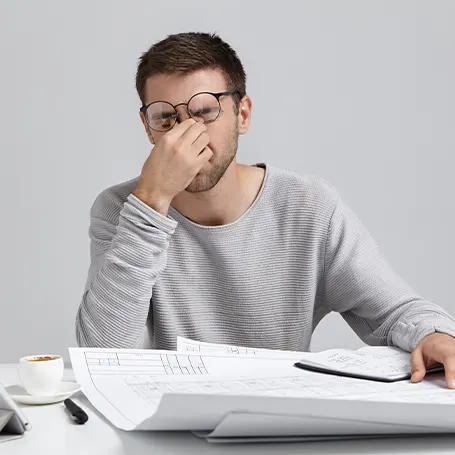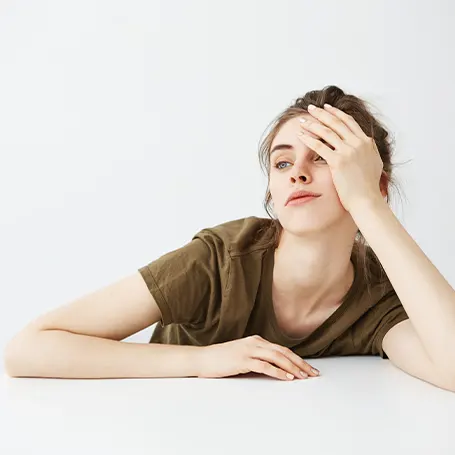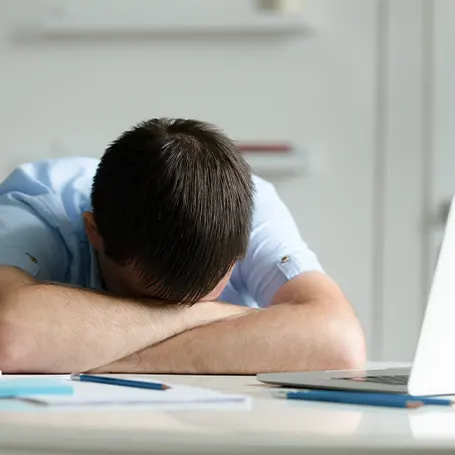Understanding dysania

To help you recognize dysania, we'll start with the basics. This condition is characterized by excessive sleepiness and difficulty waking up, which affects a person's daily productivity and mental health. Sometimes it is refereed to as chronic fatigue syndrome, but many other sleep disorders have such symptoms. And not just sleep disorders, but also major depressive disorder, sleep inertia, and other things that affect our physical and mental health.
Defining dysania
It is different from a simple lack of motivation to get up that happens sporadically. Try to picture this: the previous day you were under stress, you woke up at the first alarm – visibly grumpy. In such a situation, you would prefer to spend the whole day wrapped in a comfort blanket like a burrito. Unfortunately, some people feel this way every day, which leads to the development of depression.
That is why dysania is most often associated with such a condition. So it is constant. But, it doesn't have to be the real or the only reason. It implies significant discomfort in the person. In addition, it may be accompanied by the following symptoms…
Symptoms
The first step in combating dysania is to identify the symptoms and get medical diagnosis if possible. Constant feeling of tiredness, bad mood, irritability or constant pressure. Symptoms vary from person to person, making it a challenging condition to diagnose accurately. Don't worry, we'll split them into several groups to cover them all. Those are:
- Cognitive disarray – emotional ups and downs
- Sensory sensitivities – excessive sensitivity to sounds, textures, tastes or even light can be quite disturbing
- Motor coordination difficulties – difficult/impossible performance of tasks that require fine motor skills
- Sleep disturbances – this includes insomnia, frequent awakening, or restless sleep
- Social challenges – social anxiety or problems with establishing and maintaining deeper relationships.
Remember, these symptoms can represent other conditions as well, such as heart disease or some other underlying health condition. So you should use them as guidelines, but seek out a professional with experience in neurodevelopmental disorders. Only in this way can you be sure you are suffering from dysania and get proper treatment.
Causes of dysania

Now that you know the symptoms, it's time to move on to the cause of dysania. Have you been having problems with your sleep or mood lately? You are probably thinking now – who doesn't have these problems? If the answer is yes, you might be interested in what we have to say.
Sleep disorders
You must have felt groggy and fatigued at least once, even after a full night's sleep or too much sleep (10+ hours.) Well, one of the primary causes is in disrupted sleep pattern. How? You can mess up your sleep schedule for many reasons – frequently changing work shifts, inconsistent bedtime routines, etc.
It leads to:
- Insomnia – difficulty falling asleep, trouble sleeping, staying asleep or experiencing non-restorative sleep, which leads to difficulty getting up and poor sleep quality.
- Sleep apnea – repeated pauses in breathing during sleep (loud snoring or gasping for air), this brings frequent awakening during the night and morning fatigue
- Restless Leg Syndrome (RLS) – the uncontrollable urge to move the legs, accompanied by uncomfortable or painful sensations and difficulty falling asleep
Poor sleep hygiene can also be a consequence of excessive screen time, consumption of coffee or alcohol before bed. In short, a disturbed sleep-wake cycle leads to difficulty waking up – dysania.
Mental health factors
Depression, anxiety, and chronic stress are different conditions, but they also have a lot in common. Such states have an impact on motivation, energy levels, and overall sleep-wake patterns. Sounds familiar? Yes, these are also symptoms and risk factors of disanya. Let's take a closer look at how these conditions affect you:
- Motivation – it is very difficult for a depressed person to start and carry out daily activities, even getting out of bed is a challenge
- Energy levels – chronic stress consumes a lot of the body's resources, which causes loss of energy and fatigue
- Sleep-Wake patterns – depression, and anxiety can disrupt sleep-wake patterns in two ways (excessive sleepiness or insomnia), the reason is heightened arousal.
Lifestyle factors
During just one day, we make thousands of choices, each affecting our life. Unfortunately, some can contribute to the development of dysania. For example, the irregular sleep schedule is crucial to your internal clock/circadian rhythm. The brain wants a stable routine to know when to get up and go to bed. Otherwise, complete chaos ensues.
Excessive consumption of alcohol and coffee, especially close to bedtime, can equally harm you. We must not forget about physical activity that improves sleep duration and enhances sleep quality. On the other hand, sedentary lifestyles can contribute to difficulty falling asleep. So addressing your lifestyle choices is crucial to managing dysania.
Managing dysania

Getting up is a challenging task when stress takes over. On the other hand, we will not exaggerate. It's not bad to feel exhausted and want to get some sleep. But when it comes to a diagnosed condition, we have to be serious, because you risk much more than being late for work or some other activity.
That's why you should take steps to solve the problem as soon as possible. Otherwise, it can harm every aspect of your life.
Sleep hygiene practices
Due to the “swarming” of unpleasant thoughts, you tend to get up early and cannot continue normal sleep. In a smaller number of people, there is also excessive sleep – “sleepwalking“. However, lack of sleep does not have to be a consequence but a cause. Due to such a condition, the stress level increases and you fall into a vicious cycle of chronic stress and lack of sleep.
That is why it is important to establish a quality night's sleep (7-9 hours every night) and develop a healthy sleep hygiene . You should go to bed early and create a relaxing evening routine to help you fall asleep faster.
Cognitive-behavioural techniques
Another great thing to help you deal with dysania is CBT (Cognitive-behavioural techniques). The main principle of CBT implies that a person's way of thinking affects his emotions. It also emphasizes that negative thoughts can also affect our behaviour. So if we think about something in a certain way it will produce certain feelings about it.
Thanks to therapy guided by a psychotherapist, you will better understand your thought patterns. But you can try it yourself. Once you see what it's all about, cognitive restructuring follows – paraphrasing your thinking differently. The end result is a change in outlook on the situation in front of us.
It is an effective weapon in the fight against anxiety, which is characterized by irrational thoughts. Trust us, dysania doesn't stand a chance when it comes to CBT!
Seeking professional help
If you can't deal with stress on your own, get help. It's okay to have support from family and friends, but you need someone to look at the problem objectively. After all, none of them are seasoned professionals, right? Only then can you get proper feedback, with which you will know what to do.
Remember, the solution to the problem lies in identifying the cause of the dysania. Sometimes it's a poor sleep schedule, but often the cause is much more complex than that. Don't be afraid to visit a sleep clinic to seek a professional help.
Coping strategies

strategies. Those are:
- Problem-focused strategies – constructive activities are used in order to overcome a stressful event (only when the problem is solvable)
- Emotion-focused strategies – activities focused on emotions are applied, such as: establishing self-control, avoiding stressors (alcohol, smoking, drugs), breathing and relaxation practices,
- Meaning making – finding positive or meaningful aspects of a difficult situation, to feel differently about something (journal writing)
- Social support – connecting with close friends, to give you a sense of security and belonging
- Religious coping – it doesn't have to be organized religion, it's enough to spend time in nature or volunteer to be part of something bigger than yourself.
These skills are very useful when struggling with a mental health condition. However, they should be part of a larger treatment plan. Therefore, consider your needs and capabilities. Many great programs can help you overcome anxiety, depression or stress.
Morning routines
The initial morning stress will probably follow you throughout the day. You have a hard time getting out of bed, then you feel you are late everywhere, nothing arrives and suddenly – the day seems too short. So, let's make that morning as productive as possible! You will need a morning routine that you will strictly adhere to. For starters, get up a little earlier to have enough time to prepare to start turning into a morning person.
In that case, you can do morning stretching or meditation. Allow yourself plenty of time to prepare for the day. I know your biggest task is getting moving and getting out of bed, but try every day. Do this until you manage to stick to your morning routine, and you will get out of the vicious circle of stress and dysania.
Here are some ideas: as soon as you get up, close the curtains and let the light in, play your favourite music or turn on a TV show. Such things naturally wake us up, which means you won't fall back asleep so easily.
Mindfulness and meditation
Your mind and body communicate every day. Therefore, the brain does not only send instructions to other parts of the body. It also receives feedback, so it is vital to master relaxation and breathing techniques. Mindfulness exercises and meditation are excellent for this. They represent momentarily awareness of one's own experiences, without judgment and with acceptance.
It may seem easy to you now, but if you try to keep your attention in the present for just a few minutes. Don't let your thoughts wander (hey, no pushback). Of course, it's not easy; it takes practice.
How can that help you? Your muscles relax, your breathing slows and your blood oxygen levels decrease. This way, you send a clear message to your brain – everything is fine. Remember, stress cannot survive in a relaxed body and calm mind.
Conclusion
Well, it seems that things with dysania can be very complex. There are various underlying causes, but understanding them is the solution to the problem. This means you should pay attention to your lifestyle choices, sleep-wake patterns and morning routines. If nothing helps, seek professional guidance. We are sure you will be able to adopt healthy habits and raise self-care to a higher level. That way, you will finally unlock restful sleep, enhanced energy levels and a fresh start to the day.
Spread the word
"*" indicates required fields















I have dysania. Thanks for sharing to raise awareness